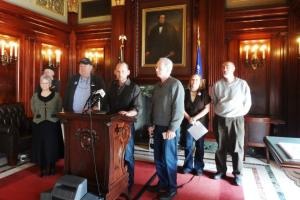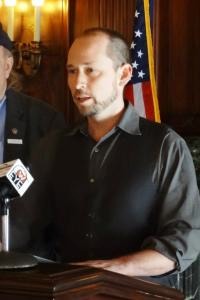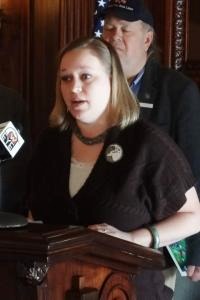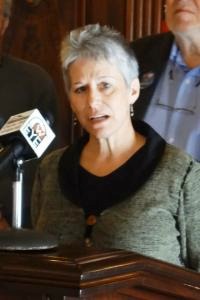Northern Officials Unite in Defense of the Water
February 21, 2013 by Rebecca Kemble and Barbara With
Elected officials from Northern Wisconsin holding a press conference at the Capitol on Thursday, 2/21/13.
In a strong statement of unity, elected officials from Ashland and Bayfield Counties traveled to Madison for the Superior Days lobbying effort and a press conference concerning the new mining bill being rushed through the legislature next week.
The mayors of Ashland, Bayfield and Washburn were joined by city council and county board members from the north to speak out about the effects a mine would have on the region. GTac, the mining company that authored the bill, plans to build a 21-mile mountaintop removal open pit iron ore mine in the headwaters of the Bad River watershed in Ashland County.
Bayfield Mayor Larry McDonald stood up for the water saying, “I am not against mining. I am against anything that will damage Lake Superior. AB1/SB1 is designed to pollute the water.”
Washburn Mayor Scott Griffiths stressed that the bill will affect more than just northern Wisconsin and the Penokee Hills. “This legislation, if passed, sets a dangerous precedent,” he said. “It demonstrates that an out-of-state company can come in and set the rules to maximize their profits and minimize their liabilities.”
Griffiths noted the reason for the rush through the legislature. “The more legislators learn about this particular piece of legislation and the consequences of the bill, the more resistance there is to pass it.”
Washburn Mayor Scott Griffith
Griffiths referred to the Freedom Formation near Baraboo. “Today it might be the Penokee Hills; tomorrow it might be Baraboo Bluffs.”
Ashland City Council Member Kelly Westlund visited with several legislators before the press conference and acknowledged their intentions to create jobs. “But unfortunately to us, the people it was meant to help, it’s clear the risks far outweigh the benefits.”
Westlund referenced the losses that local governments would suffer. “It would render our local county zoning ordinances irrelevant. We’re not happy with exemptions from environmental regulations that keep our watershed clean. The idea of paying the bills for infrastructure until a massively expensive mining company turns a profit is daunting, to put it mildly. Can you imagine what this would be like if these things happened in your community?”
Westlund called out specific legislators to take a stand against the Republican leadership and vote against this legislation. “Senators Luther Olsen, Robert Cowles, Shelia Harsdorf, Michael Ellis, and Jerry Petrowski have all shown independence when it mattered most. They fought to preserve local control, and honor the will of their constituents. It’s not an easy thing to do. It’s takes guts. ” She added, “If you look at this bill objectively, you’ll know it’s a bad bill. While our community is at risk today, passing this bill makes it a law for all of us in this state.”
Ashland City Council Member Kelly Westlund
AP reporter Todd Richmond interjected the stereotypical perspective that the north is poor. “There’s no dispute your region is struggling economically. You can’t say that isn’t true.”
Ashland City Council Member Richard Ketring dispelled the idea that Ashland and the surrounding areas are in a slump. “We’re not growing fast, but we’re growing steady and sustainably in medical care, education and industry.” Ketring mentioned the booming technology sector that has been hiring for the last three years, managing growth through the recession. “It’s a misnomer to look at us and saying that we’re struggling and poor.”
Westlund also dispelled the myths that northern Wisconsin is worse off than any other region. “Our agriculture is growing by leaps and bounds. The only thing holding us back is the need for more people growing more food.”
She went on, “Tourism is growing, forestry, recreation, We have a lot of innovative entrepreneurs starting home-based businesses. What’s so dangerous about this bill is that because so many of those things are dependent on sustainable natural resource use, that if something happens to the water, it could take away all these opportunities that are finally getting a chance to see the benefits.”
Ashland Mayor William Whalen addressed what it means to create a livable community. “The city of Ashland for the last decade has spent considerable money building our infrastructure and making a place where people want to live. Because we are so far north, we need things to attract people with and quality of life is certainly an attraction. Bringing in an extraction industry that will affect our quality of life will hurt us economically.”
Bayfield County Board Supervisor Beth Meyer
When asked about GTac’s change of position from two years ago when they claimed they could work within current regulations to the massive deregulation bill they are now proposing, Mayor Griffiths said, “I wish I had video clips of what the original speech was, and how that presentation by GTac has evolved over the course of the last two years.”
Westlund agreed: “We found that the people writing the legislation have no interest in what we think about it, they have no interest in giving us the assurances that we need to know our communities are protected.”
She added, “The company has gone above and beyond to cause divisions in our communities. They’ve been really bad actors and they’ve shown us that we can’t trust them. Why would we give them something so valuable and so important to our communities, when all they’ve given us is ‘Trust us, well fix it but we’ll tell you how after you give us the permit.’ That’s not acceptable.”
Bayfield County Board Member Beth Meyer reiterated that the bill has brought the north together across generations. “In our county boardrooms and city halls, we have grandmothers testifying, we have young children. We are 100% unified in the protection of the water.”
AB1/SB1 will be taken up by the Joint Committee on Finance next Monday, February 25, 2013. It is tentatively scheduled for a final vote in the Senate the following Wednesday, and in the Assembly the following day.




